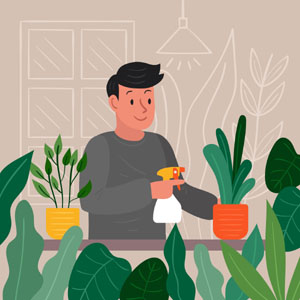Growing an herb garden indoors can be rewarding and fun. And it can be simple if done the right way from the start. Proper education before you get going is the key to success.
Here are eight tips to keep in mind when growing an herb garden indoors.
1. Adequate Sun Exposure – Most herbs need sun for about six to eight hours a day, so make sure you find a location in your house that offers this amount of sunlight. Proper sunlight is also responsible for the flavor of your herbs. The more sunlight they get, the better the flavor.
2. Proper Temperature – Keep the temperatures in your house or the room the herbs are located in at around 65 to 75 degrees Fahrenheit. If you need to reduce the growth of herbs, reduce the temperatures to about 60 degrees Fahrenheit.
3. Water – Herbs need a moderate amount of water daily. It is best to keep the soil of herbs damp. Watering can easily be forgotten, so make a plan and keep to a schedule. Remember, now that the herbs are indoors they do not get water from rain, so it is up to you to keep up with it.
4. Keep Herbs Separate – For long-term success, you should keep your herbs separate. This way they can each get the individual attention they need. It also helps with plant rotation, and if one plant gets infested with pests the others don’t have to suffer.
5. Proper Containers – Containers need to have proper drainage so that the herbs are not sitting in too much water. Add a thin layer of rocks to the bottom of your pots before filling with soil to allow the water to settle there instead of in the soil. You may even need to poke or drill a few holes in the bottom of the container if they don’t have any to start with.
6. Rotate – Herbs need proper rotation under the sun to help with air circulation and to prevent mold. Turn your plants or rotate them a little every day so that each side gets the right amount of sun. This will also promote even growth.
7. Soilless Potting Mix – Indoor herbs need special attention when it comes to soil because it needs to provide more drainage. Dirt from the ground is too compact and usually less nutritious. Make sure you pick a soil that is listed for indoor gardens.
8. Feed with Fertilizer – Fertilize your herbs once a week to promote strong growth. The best fertilizers for herbs are seaweed extract or fish based.
Keep these tips in mind when starting or growing your indoor garden. This way you are sure to have a garden that will keep up with your delicious recipes. You’ll wow your family and your guests.
